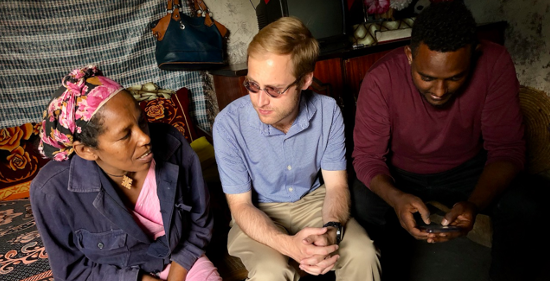Justin Banerdt, M.D., M.P.H. ’20 discusses his professional journey in improving care for COVID-19 in low income areas
by David Cohen

Recent alumnus, Justin Banerdt ’20 who graduated from the Global Health track of Vanderbilt’s M.P.H. program, reflected on his culminating practicum experiences and professional outlooks in a recent interview.
Banerdt completed his practicum in February and March 2020 for Ethiopia Act. Ethiopia Act is a community based public health organization that addresses the needs of marginalized HIV positive families in Addis Ababa. The organization also employs a biopsychosocial-economic approach to poverty alleviation and aims to provide comprehensive resources to communities to address larger public health issues. Banerdt was initially scheduled to help the organization evaluate a number of programs, including ones for community-based insurance, HPV vaccinations, and basic income grants. As the COVID pandemic began, he determined that addressing COVID issues would provide an additional meaningful experience.
“[Ethiopia Act] wanted to be very proactive about coming up with a comprehensive policy for protecting the people we were serving from COVID. It was a good opportunity to work with an organization on the ground for COVID mitigation, trying to figure out how to protect a vulnerable population…. As health professionals, the virus has brought to light many of the inequities these communities face… I think the program did a fantastic job of trying to help families become self-sufficient to the point that they no longer needed assistance,” said Banerdt.
Following his practicum, Banerdt has focused on publishing research he conducted in 2017. The data collected was on outcomes of critical illness and delirium among hospitalized patients in a low resource setting of Zambia.
“I think [this research] has relevance now in the context of a global pandemic where you have patients with critical illness in low income settings, which we are trying to figure out how to better care for. Our research shows that delirium is a strong independent predictor of mortality…. Delirium is also very prevalent in critically ill patients with COVID in the United States and Europe, and I imagine that will be the case in Africa as well. I’m hoping to write a perspective piece on this information in the coming months,” said Banerdt.
Since graduating from Vanderbilt, Banerdt is in post graduate residency training at the Yale School of Medicine. He seeks to expand his work on capacity building in research limited settings and investigate patient access to oxygen in sub-Saharan hospitals. His long-term interests, however, lie in global health and pulmonary critical care medicine.
“In my career, I hope to not only improve the treatment of patients who are critically ill, but also work towards mitigating risk factors for critical illness, many of which are complex social economic factors, like lack of housing and access to primary care,” said Banerdt.
In addition, Banerdt believes Vanderbilt’s M.P.H. program has provided him with a stronger framework for approaching such complex issues.
“I learned a lot of skills in regards to program management and program evaluation in public health. The M.P.H. Program helped me think in an interdisciplinary way, for example, how to rigorously analyze and contextualize global health inequities,” said Banerdt.
Ultimately, Banerdt believes public health demands interdisciplinary interactions between economists, policy makers, and front-line health professionals to truly address structural causes of issues. He hopes there will be an increased commitment towards addressing driving factors for health inequities in the future.
Quotes have been edited for clarity and length.